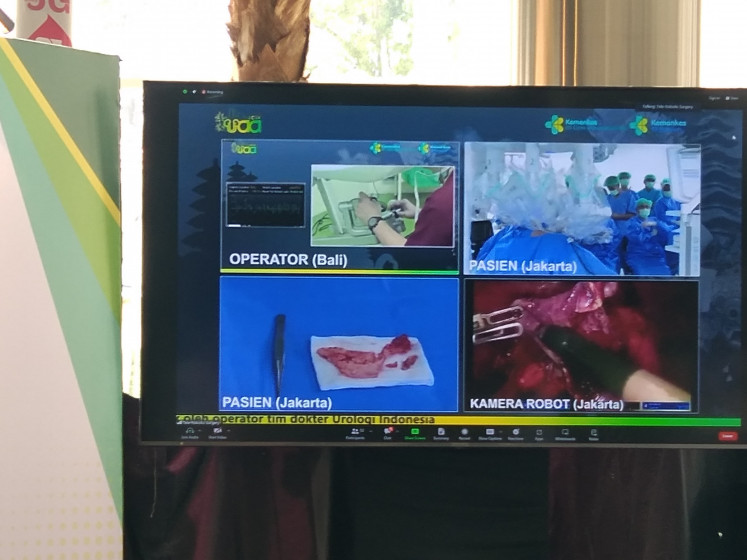Popular Reads
Top Results
Can't find what you're looking for?
View all search resultsPopular Reads
Top Results
Can't find what you're looking for?
View all search resultsSharia: Piety at home
My upbringing was far from being âliberalâ and latitudinarian
Change text size
Gift Premium Articles
to Anyone

M
y upbringing was far from being 'liberal' and latitudinarian. When I was a child in the village of Cebolek in the Central Java town of Pati my father was harsh and strict in setting moral standards for me and my siblings.
And this was not peculiar to my family; everybody else's home followed the same rules.
We lived in a village where strict morality was the only game in town. Music, for example, was anathema to my family, the reason being that it led you away from remembering God. The axis of a believer's life, so went the wisdom of my devout family, was to remember and worship God.
Anything that distracted you from this noble goal should be kept at bay. Anything that increased your proximity to God and remembering him should be welcome.
Except for the music of Om Kalthoum, the Egyptian female singer whose exquisite and miraculous voice earned her the honorary title of 'The Star of the East', kaukab al-sharq.
My father fell prey to her spell. He acquired a modest collection of her albums. But he would not let himself indulge in this 'mundane affair' every day. He only played Kalthoum's recordings on Friday mornings after he finished his lecture on the Koranic exegesis at 7 a.m. He would spend two or three hours on Om Kalthoum before he left for Friday prayers at the mosque.
As my father's days rolled by in this routine, my ears got used to Kalthoum's music. This was the only sweet music I was lucky enough to be exposed to. Western or even Indonesian music was far away from home. I was caught by my father with a transistor radio listening to dangdut music with my friend. My father was so enraged that he confiscated this sinful device and broke it into pieces.
My father had a list of dos and don'ts, and it grew as time went by and as our society was corrupted in his eye by modern technology. He was very unhappy with any types of sports, particularly soccer. My father told me, relying on the authority of my grandfather who was a noted Islamic scholar, a faqih, that soccer was forbidden since it distracted you from your sole, noble goal of worshipping God.
Besides, soccer was a pointless game that suited the non-believer's life. Those who believed in God had better and higher causes to serve other than such a frivolous affair.
Piety ruled every aspect of our life in the village. Every single act was governed along divine rules promulgated in what is now called sharia. My father never became a member of an Islamic party that advocated the application of sharia.
But his entire life was imbued with and ruled by this divine law. For him sharia was not political rhetoric or the 'ideologized' agenda that we see now rampant among Islamists of various hues.
Islamic law was meticulously practiced in my family, not out of political motives. It was not imposed by the state apparatus. Sharia was part of my father's life because he chose voluntarily to make it so. Nobody put a gun to his head to live such a life. No moral authority policed his life. Everything sprung from his voluntary decision to live under God's rule.
Even though I suffered from this strict morality, I took pride in once living such a pious life. I never lamented my past upbringing in such a stoic environment.
As I contemplate the current debates among Islamists, I see a stark contrast between sharia as advocated by those modern Islamists and sharia as lived by my father. Sharia in my father's life embodied what Tarek Fatah termed in his book, Chasing Mirage, 'the state of Islam' as opposed to the 'Islamic state'. Sharia in the rhetoric of modern Islamists is part of their larger ideology to recreate the Islamic state, a project that is so elusive that it is nothing more than a mirage, as Fatah aptly put it.
The problem with sharia as proposed by Islamists is that it tends to be 'solidified' into a fixed and rigid formula that is impervious to any critical examination. Any critical inquiry will end up being accused of being sedition against God, Islam and the Prophet.
After all, sharia as vouched in modern Islamist ideology relies on state authority for its realization. It is acted upon out of imposition, not from piety as I saw in the exemplary life of my father.
I say yes to sharia as part of piety at home; but no to it as a political project!
______________________
The writer is a Muslim scholar and founder of the Liberal Islamic Network (JIK), based in Jakarta.









